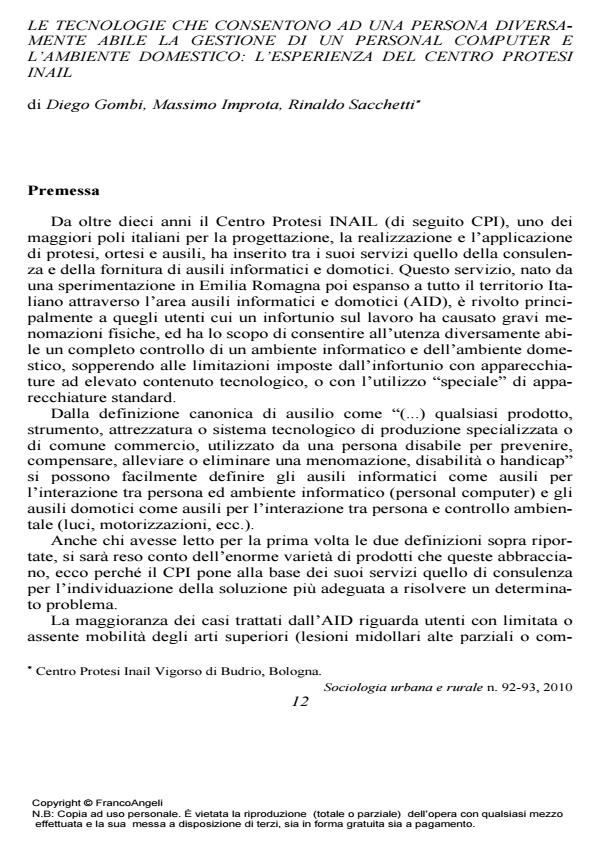The Information Technology applied to disabled people: the experience of the Inail Prosthetic Center
Journal title SOCIOLOGIA URBANA E RURALE
Author/s Diego Gombi, Massimo Improta, Rinaldo Sacchetti
Publishing Year 2011 Issue 2010/92-93
Language Italian Pages 18 P. 12-29 File size 1106 KB
DOI 10.3280/SUR2010-092002
DOI is like a bar code for intellectual property: to have more infomation
click here
Below, you can see the article first page
If you want to buy this article in PDF format, you can do it, following the instructions to buy download credits

FrancoAngeli is member of Publishers International Linking Association, Inc (PILA), a not-for-profit association which run the CrossRef service enabling links to and from online scholarly content.
Since ten years, the INAIL Prosthetic Center (CPI), one of the major european pole for research, development and application of prostheses, orthoses and aids,has been including among its services both the counseling and the supply of computer aids and home automation. This service is primarily intended for those users that suffered serious physical impairments in an workrelated injury. At the beginning it started from an experimentation in Emilia Romagna then it have been extended to the whole Italian country thanks to the action of the CPI home automation and computer aids department (AID). The main aim of this department is to enable a disabled user to control a computer workplace, home environment, by means of the high-tech equipment, or using "special" adaptations of the standard equipment. Most of the cases managed by the AID concerns people with limited or absent mobility of the upper limbs (partial or complete high spinal cord injury, crush injuries, nerve injury, results of amputations, etc.). More recently new users have sensory impairment (mainly problems with vision), post traumatic disorders of language (aphasia, etc..) and cognitive problems (usually combined with mobility problems as a result of TBI). After an overview of the major systems existing on the market and of the procedures used by Inail for the supply of the computer and automation aids, some case studies will be presented as example of the different types of solutions to enhance the communication ability and the autonomy of disabled people.
Keywords: Information technology, home automation, disability, computer aids, blind, disorder of language
Diego Gombi, Massimo Improta, Rinaldo Sacchetti, Le tecnologie che consentono ad una persona diversamente abile la gestione di un personal computer e l'ambiente domestico: l'esperienza del Centro Protesi Inail in "SOCIOLOGIA URBANA E RURALE" 92-93/2010, pp 12-29, DOI: 10.3280/SUR2010-092002